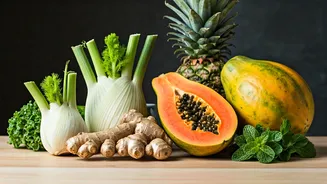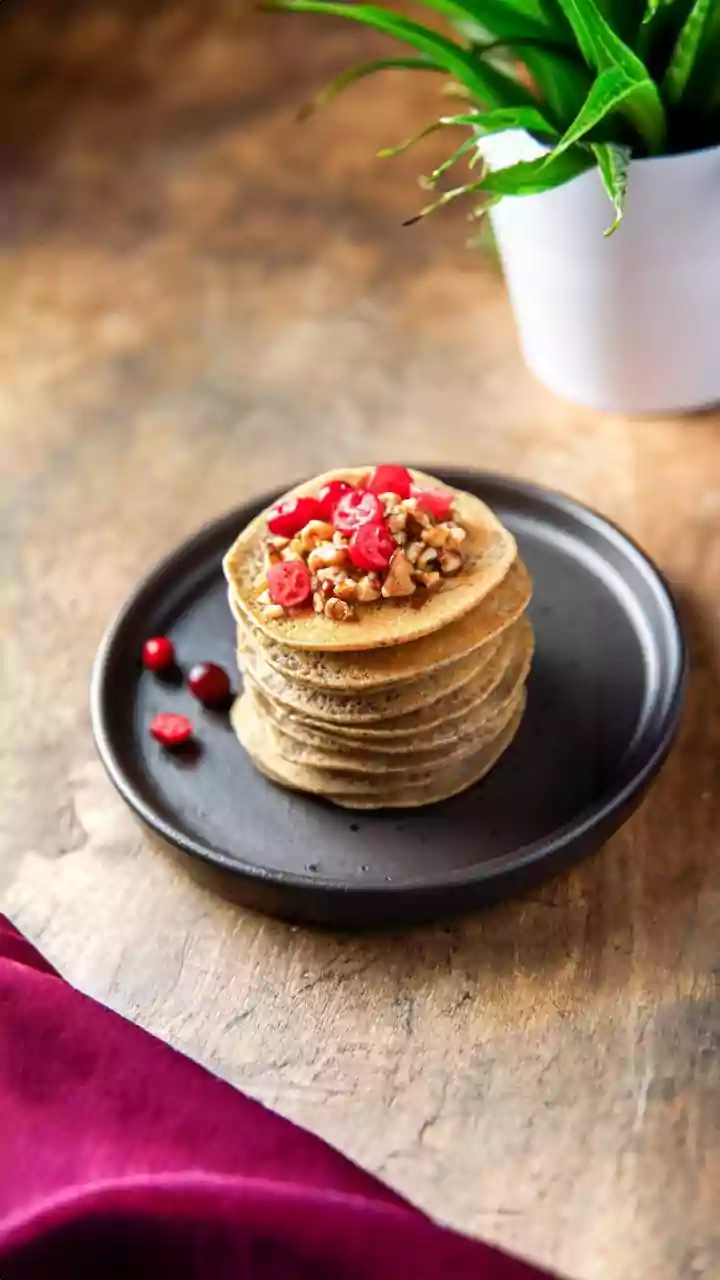Peppermint Power
Peppermint isn't just a refreshing flavor; it's a natural remedy for bloating. Studies show that peppermint oil helps relax the muscles in your digestive
tract, allowing gas to pass more smoothly. This can significantly reduce bloating and discomfort. Incorporating peppermint into your diet can be as simple as drinking peppermint tea after meals. You could also try adding a few drops of peppermint oil to water or using peppermint-infused candies. Remember, a little goes a long way, and consulting a healthcare professional is always advisable before starting any new dietary supplements or treatments, particularly if you have existing health conditions or are taking medication.
Ginger's Digestive Aid
Ginger has long been celebrated for its ability to soothe upset stomachs and alleviate bloating. This is due to gingerol, a compound with potent anti-inflammatory and antioxidant properties. Ginger helps speed up digestion, moving food through the digestive tract more efficiently. You can consume ginger in various forms, such as fresh ginger root in your meals, ginger tea, or ginger supplements. Ginger helps in reducing inflammation, which contributes to gas and bloating. Consider adding ginger to your daily routine for a more comfortable digestive experience.
Fennel Seeds Benefit
Fennel seeds are another natural remedy known for their ability to combat bloating. They contain compounds that relax the intestinal muscles, easing gas and promoting smoother digestion. Fennel seeds also contain volatile oils that may help reduce inflammation in the gut. These seeds can be chewed directly, or they can be steeped in hot water to create fennel tea. Adding fennel seeds to your dishes can not only enhance the taste but also improve your digestive health, offering relief from bloating.
Banishing Bloat with Bananas
Bananas are a great source of potassium, which plays a critical role in regulating fluid balance in the body. Bloating can sometimes be caused by excess sodium, leading to water retention. Potassium helps counteract this by supporting the excretion of excess sodium through urine. Eating a banana can help to reduce water retention, thereby reducing bloating. Besides, bananas are high in fiber that supports regular bowel movements, preventing constipation, another cause of bloating. Bananas can be enjoyed as a snack or added to breakfast meals.
Turmeric's Anti-Inflammatory Action
Turmeric, with its active component curcumin, is renowned for its anti-inflammatory properties, which can help to soothe digestive distress and alleviate bloating. Inflammation in the gut can disrupt the digestive process, leading to gas and bloating. Curcumin, the active ingredient in turmeric, helps reduce this inflammation, which can alleviate the symptoms. Turmeric can be used in cooking, added to smoothies, or consumed as a supplement. Using turmeric as part of your daily food intake not only enhances flavor but also may assist in digestive health.
Pineapple's Digestive Enzymes
Pineapple contains bromelain, an enzyme that aids digestion by breaking down proteins. Efficient protein breakdown can ease digestion, which in turn reduces gas and bloating. Bromelain helps to reduce inflammation in the gut, contributing to a more comfortable digestive experience. Eating pineapple, either fresh or in juice form, can help increase bromelain consumption. It is useful in helping improve digestive health.
The Power of Yogurt
Yogurt, particularly varieties with live and active cultures (probiotics), supports a healthy gut by promoting the growth of beneficial bacteria. These bacteria aid in the digestion of food and help prevent the overgrowth of gas-producing microbes. The balance of gut bacteria plays a critical role in minimizing bloating. Including yogurt in your daily diet, perhaps in the morning or as a snack, will improve your gut health and reduce instances of gas and bloating.
The Benefits of Chamomile
Chamomile is often used as a gentle remedy for digestive issues. Chamomile helps by relaxing the muscles of the digestive tract. This can help to release trapped gas. The anti-inflammatory properties of chamomile contribute to its soothing effects. Drinking chamomile tea can be particularly beneficial after meals to aid digestion and prevent bloating. Its mild flavor and relaxing qualities make it an ideal choice for the evening.
Cucumber: Stay Hydrated
Cucumbers are known for their high water content, which aids in hydration and can prevent bloating associated with constipation. Proper hydration is essential for efficient digestion, ensuring that food moves smoothly through the digestive system. Cucumbers are also rich in antioxidants, which can contribute to reducing inflammation in the gut. Eating cucumbers raw in salads or as a snack supports digestive health and ensures you stay hydrated.
Water's Vital Role
Drinking sufficient water is vital for preventing bloating and promoting optimal digestion. Water helps to keep things moving through your digestive system, preventing constipation and water retention. Dehydration can worsen bloating, so maintaining adequate fluid intake is crucial. Aim to drink at least eight glasses of water daily. Ensure that you are adequately hydrated to facilitate comfortable digestion and minimize bloating throughout the day. Water is essential for every bodily function, including efficient digestion.



















